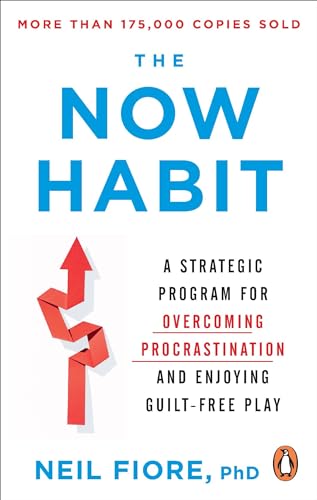
The Now Habit: A Strategic Program for Overcoming Procrastination and Enjoying Guilt-Free Play
Neil A. Fiore
Publisher
Ebury Digital
Publication Date
12/28/2023
ISBN
9781529930658
Pages
215
Categories
Questions & Answers
The root cause of procrastination is often attributed to anxiety associated with starting or completing tasks, stemming from fears of failure, perfectionism, and criticism. The Now Habit redefines procrastination as a coping mechanism for dealing with these anxieties. It emphasizes that procrastination is not a character flaw but a learned behavior that provides temporary relief from stress. By adopting a positive psychology approach, The Now Habit encourages individuals to view procrastination as an attempt to protect self-worth and independence. It promotes the idea that by addressing the underlying fears and redefining the relationship with work, one can overcome procrastination and develop a more productive and fulfilling life.
The Now Habit encourages a shift from procrastination to productivity by emphasizing "guilt-free play." It argues that integrating play into one's schedule actually enhances productivity. By scheduling regular leisure activities, individuals learn to balance work and play, reducing the fear that work will consume all their time. This approach helps alleviate the guilt associated with enjoying leisure, making it easier to return to work with renewed motivation. The concept of "pulling" oneself towards work through the anticipation of play (the "pull method") is more effective than the traditional "push method" that relies on threats and fear. This balance between work and play creates a positive cycle, fostering a mindset where work is seen as a part of life, not a burden, and leading to increased productivity and creativity.
The Now Habit offers a strategic program to overcome procrastination through a combination of tools and techniques. Key tools include:
-
Creating Safety: This involves identifying and addressing the underlying fears and anxieties that lead to procrastination, such as fear of failure or perfectionism.
-
Reprogramming Negative Attitudes: By replacing negative self-talk with positive affirmations, individuals can shift their mindset from one of victimhood to empowerment.
-
Guilt-Free Play: Scheduling regular leisure time helps maintain work-life balance and reduces the guilt associated with procrastination, fostering a desire to return to work.
-
Three-Dimensional Thinking and the Reverse Calendar: This method helps manage time effectively by breaking down tasks into smaller, manageable steps and setting deadlines.
-
The Work of Worrying: This technique involves anticipating potential problems and developing plans to address them, reducing the fear of the unknown.
-
The Unschedule: This tool helps manage time by scheduling guilt-free play and work, ensuring a balance between the two.
-
Working in the Flow State: This technique involves entering a state of focused energy and concentration, enhancing productivity and creativity.
-
Fine-Tuning Your Progress: This includes planned setbacks, mental rehearsal, and effective goal-setting to maintain motivation and resilience.
These tools and techniques work together by addressing the root causes of procrastination, providing practical strategies for managing time and emotions, and fostering a positive mindset towards work and play. By integrating these tools into daily life, individuals can overcome procrastination and achieve their goals.
The Now Habit tackles the psychological barriers of procrastination, like fear of failure and perfectionism, by adopting a positive psychology approach. It redefines procrastination as a coping mechanism for anxiety associated with starting or completing tasks, rather than a character flaw. The book emphasizes the importance of the human spirit's motivation and curiosity, encouraging readers to reconnect with their innate drive to produce.
It addresses fear of failure by promoting self-compassion and understanding that mistakes are part of the learning process. The Now Habit encourages the use of positive self-talk to replace negative thoughts, fostering a sense of safety and reducing the fear of judgment. It also introduces the "Pull Method" of self-motivation, which focuses on the pleasure and success associated with tasks, rather than the pain and anxiety of failure.
To combat perfectionism, the book suggests breaking tasks into smaller, manageable steps and celebrating small achievements. It encourages readers to accept imperfection as a part of being human and to focus on the process rather than the end result. By integrating guilt-free play into their schedules, The Now Habit helps to balance work and leisure, reducing the pressure to be perfect and fostering a more enjoyable and productive work-life balance.
The "Unschedule" in The Now Habit plays a crucial role in overcoming procrastination by focusing on scheduling leisure activities first, followed by work. It differs from traditional time management techniques in several key ways:
-
Prioritizes Play: The Unschedule starts by scheduling leisure and recreational activities, ensuring that play is not seen as a luxury but as an essential part of life. This approach helps shift focus from work to play, creating a subconscious urge to return to work.
-
Realistic Time Management: It provides a realistic view of available time, accounting for daily chores, meetings, commuting, meals, and sleep. This helps overcome the illusion of having unlimited time for work.
-
Small, Achievable Goals: The Unschedule encourages starting with short, manageable work periods (e.g., 30 minutes), reducing the fear of being overwhelmed and making it easier to start.
-
Immediate Rewards: It emphasizes rewarding oneself after short work periods, fostering positive associations with work and reinforcing the habit of starting.
-
Reverse Psychology: By limiting work time and emphasizing play, the Unschedule uses reverse psychology to reduce procrastination, as it builds a subconscious desire to work more and play less.
-
Focus on Starting: Unlike traditional time management, which often emphasizes finishing tasks, the Unschedule focuses on starting work, making it easier to initiate tasks and build momentum.
In summary, the Unschedule in The Now Habit is a unique approach that integrates play and work, uses reverse psychology, and focuses on starting rather than finishing, making it an effective tool for overcoming procrastination.